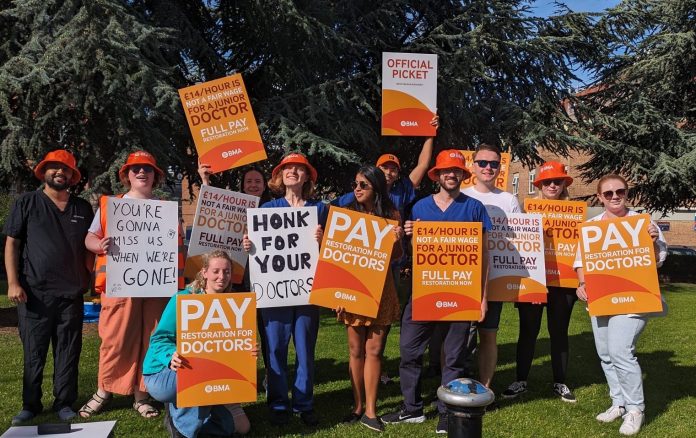Tatyana Sarnecki, junior doctor BMA rep at the Royal London Hospital, east London, spoke to Hugo Pierre in a personal capacity
Our main issue with pay is that for the last 15 years we’ve had sub-inflation pay rises. The pay for an F1, new out of university, is £32,398, despite being thousands or even tens of thousands of pounds in debt, and facing the same issues that everyone else in the country does with the cost-of-living crisis, ie housing shortages and rising food and energy prices. You’d expect that, over the years, doctors would get decent pay rises, but it’s not as high or as quick as people imagine.
As an example, what changed with the 2016 contracts was that they took away completely the years of experience you have if you change specialities. If, for example, I was a surgeon for eight years and then maybe had children and my life changed and I changed to be a GP, I would go back down to the lowest level on the specialties pay scale again.
On top of the pay issues, we have to pay yearly fees, which are mandatory. Our GMC (General Medical Council) fee is £433 a year, and if you’re a trainee, there’s the Royal Colleges fees, which are also a few hundred pounds. And things that are mandatory to our training, such as our training portfolio, cost around £200 per year, or courses each costing £700-1000. All things that you might expect would be free, but are not. On top of that, we have to pay for our own exams, which have a very high failure rate. If you want to become a specialist in a particular field, e.g. histopathology, the second exam costs £1,500 and the pass rate is only 40%.
And people are not aware how difficult the working situation is. Doctors work weekends, night shifts, plus all the extra work outside the normal hours, studying for exams, preparing their portfolio. All this extra work you’re expected to do in your free time.
We have a ‘rolling rota’, meaning that it is set in stone for a year when you are working weekends and night shifts. It’s then up to you to swap your shifts if you want a holiday. Irrespective of what the reasons are, it’s dependent on the willingness of your colleagues to swap. It’s something you’d think would be a managerial role. It’s unnecessary and just ruins our lives.
Hugo: What has been the impact of pay levels on recruitment to the NHS?
Tatyana: We see many doctors leaving the NHS. And the government is trying to plug the gap by bringing thousands of people from abroad, and by training non-doctors to take over clinical care. Which in the end will lead to a reduction in quality of healthcare. It’s about how to retain doctors; pay and better working conditions are a key part of that.
Hugo: Whenever NHS workers go on strike there’s an almost automatic sense of solidarity from the rest of the working class. Have junior doctors felt that?
Tatyana: Definitely. Especially on the pickets. 90% of people walking by support us, they say: “The government should pay you”, “Save the NHS”. The nurses are great at supporting us and other unions have asked: “How can we help you?”
We are showing that we as doctors stand together, by striking alongside the consultants, with a Christmas Day level of service. Then the junior doctors continue, with full walkouts. We are planning a joint strike again on 2,3 and 4 October, and on 3 October there will be a big demo in Manchester at the Tory party conference. We want everyone to join us on that day!
Hugo: If the BMA were to put a call out to other unions, and if the TUC were to back that and call for it, it could make that a massive day. Other activists in other unions could push in our unions and on our executives to make that a massive demo in defence of the NHS.
Tatyana: I would appreciate that! But these decisions are not mine to make. This and everything mentioned is my view, and not necessarily that of the rest of the BMA.
STOP PRESS: Tories threaten the BMA
Rob Williams, chair of the National Shop Stewards Network (NSSN), says:
The NSSN stands in solidarity with BMA consultants and junior doctors. The Tories have threatened them with the new minimum services anti-union law.
If the BMA are attacked, all unions must be prepared to take action together to defend them, the NHS and the right to strike.
The TUC must enact its motion agreed at its Congress, that stated “Congress pledges 100% solidarity with any trade unions attacked under these MSL laws.”
- See ‘A thunderstorm is coming’
- The full composite can be seen at tuc.org.uk/Congress2023







